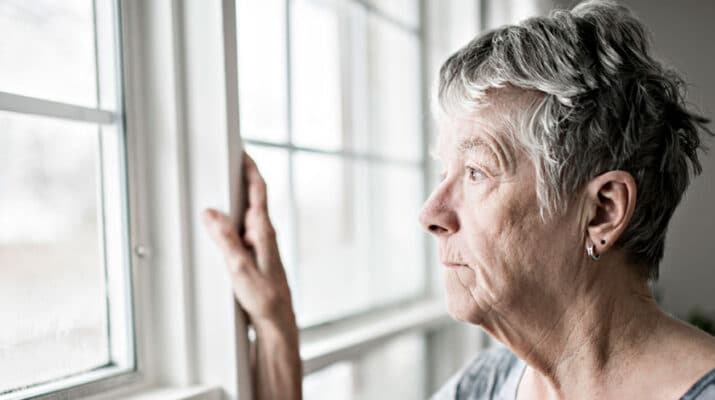Isolation has had negative impact on people living with cognitive impairment
By Deborah Jeanne Sergeant
Social isolation during the pandemic has brought a myriad of changes, from the inconsequential to the life changing. For people with Alzheimer’s disease or another form of dementia, isolation can have lasting negative effects.
“There’s a concern when people are isolated,” said physician Sharon Brangman, professor of medicine and head of the geriatric department at SUNY Upstate Medical University. “There’s a difference between being lonely and isolated. If isolated, you don’t have social connections to meet your needs. Isolation protects them from the virus but causes collateral damage.”
Although most healthy people can go places even during quarantine, most people with Alzheimer’s or another form of dementia are at higher risk because they are likely elderly or have other health issues. Many have both age and comorbidities against them. They often rely upon others to meet their needs at certain levels.
“Those who are homebound have relied on the outside world to maintain them in their home. They have to decide if they want a home health aide to come into their home,” Brangman said. “Some patients weren’t getting food and were losing weight. They don’t know how to go online and order groceries.”
Brangman said she has had some patients terrified to leave their homes, which can lead to lack of exercise, medical care and socialization. This leads to further physical and mental deterioration.
“My patients can’t wait a year or two years,” Brangman. “We have to figure out ways now to help maintain cognitive and physical functioning. We all know quality of life has more components than that eat, sleep and watch TV.”
If the person with dementia would have normally gone to a day program but has been at home with a caregiver trying to work from home full time, the caregiver is in a position of trying to juggle both responsibilities.
“Accessibility to respite has likely decreased during this time due to their personal feelings and also the availability to access care,” said Katrina VanFleet, licensed master social worker and chief program officer for the Alzheimer’s Association, Central New York Chapter. “That becomes a lot of the caregivers to manage. It’s a lot for someone to try to manage without those breaks and that assistance.”
Even as some respite opportunities have begun to open, such as caregivers going into homes, families worried about coronavirus haven’t returned to that routine.
Mary Koenig, administrator at Heritage Memory Life Community, affiliated with Loretto, encourages caregivers at home to establish a new routine during the pandemic to help create a safe sense of normalcy for their loved one.
“All of the things we’re all experiencing during the pandemic — the frustration, confusion and anxiety — is exacerbated for anyone with cognitive decline,” she said “People with Alzheimer’s have a routine. All these things are taken away.”
She said that people who are moderately confused may not understand exactly what’s happening but know that something’s different. That can cause distress. It’s also challenging for those with hearing impairment to understand caregivers who are wearing masks as their voices sound muffled and their lips and expressions are concealed.
For those who live in a nursing home or assisted living, their family cannot visit, they’re entirely dependent upon staff for socialization. Some individuals may feel confused about why no one visits anymore.
If using technology is already frustrating, it won’t make this situation any easier. But those who already use technology may find some comfort in connecting through a screen.
“They worry about their kids,” Koenig said. “They’re still parents. I hear them on Zoom calls that they’re worried about their kids and grandkids. Reassure your loved one that you’re OK because there is that sense of not knowing. I find it interesting that even in the most confused, they worry about others.”
Reaching out to the Alzheimer’s Association can help individuals and families obtain information on the condition.
Physician Anafidelia Tavares, the state-wide research liaison for the Alzheimer’s Association, said that discussing neurological issues over the phone with physicians is difficult. In addition to its regular assistance, the organization’s 24-hour helpline (800-272-3900) has been offering families support in navigating telehealth, such as ideas on what to ask doctors over the phone and ways to discuss their own or their loved one’s mental health.
Tavares said that the organization has been working with families on how they can reduce their loved one’s risk of COVID infection.
The association is also helping people who have never used telehealth with tasks like logging onto Zoom or engaging in conference calls.
“For the caregivers who are struggling in the pandemic, we are here for them,” Tavarez said. “Alzheimer’s disease doesn’t have to be a lonely journey. We have all these free, virtual services. Our helpline is available with well-trained staff and social workers to respond to whatever your needs are. We have emotional support groups and they share strategies that work for them.”

